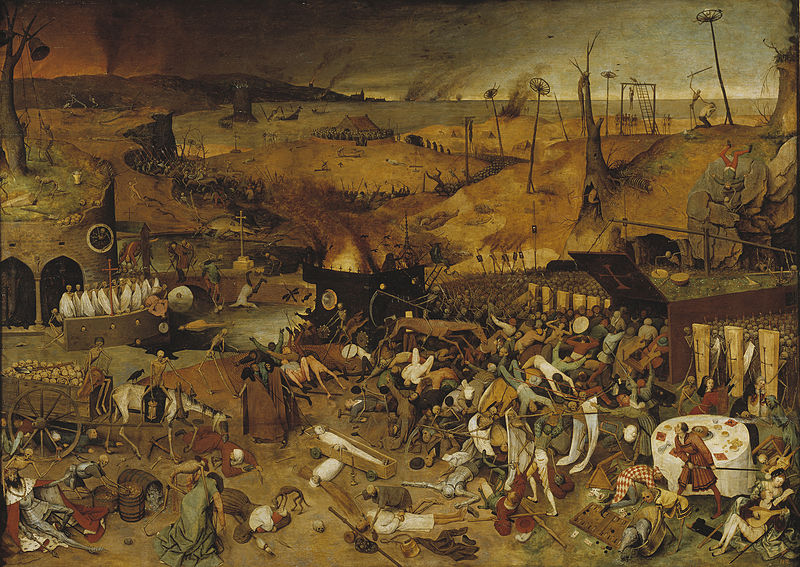Netherlandish Proverbs- By Pieter Bruegel the Elder:
Netherlandish Proverbs (Dutch: Nederlandse Spreekwoorden; also called The Blue Cloak or The Topsy Turvy World) is a 1559 oil-on-oak-panel painting by Pieter Bruegel the Elder that depicts a land populated with literal renditions of Dutch proverbs of the day. The picture is overflowing with references and most of the representations still can be identified; while many of the proverbs have either been forgotten or never made the transition to the English language,  some are still in use. Proverbs were popular during Bruegel's time: a number of collections were published including a famous work by Erasmus. Frans Hogenberg had produced an engraving illustrating about 40 proverbs around 1558 and Bruegel had painted a collection of Twelve Proverbs on individual panels by 1558 and had also produced Big Fish Eat Little Fish in 1556, but Netherlandish Proverbs is thought to be the first large scale painting on the theme. Rabelais depicted a land of proverbs in his novel Pantagruel soon after in 1564. some are still in use. Proverbs were popular during Bruegel's time: a number of collections were published including a famous work by Erasmus. Frans Hogenberg had produced an engraving illustrating about 40 proverbs around 1558 and Bruegel had painted a collection of Twelve Proverbs on individual panels by 1558 and had also produced Big Fish Eat Little Fish in 1556, but Netherlandish Proverbs is thought to be the first large scale painting on the theme. Rabelais depicted a land of proverbs in his novel Pantagruel soon after in 1564.
Bruegel's paintings have themes of the absurdity, wickedness, and foolishness of humans, and this painting is no exception. The picture originally was entitled The Blue Cloak or The Folly of the World, which indicates he was not intending to produce a mere collection of proverbs, but rather, a study of human stupidity. Many of the people depicted show the characteristic blank features that Bruegel used to portray fools.
His son, Pieter Brueghel the Younger, specialised in making copies of his father's work, and painted up to twenty copies of Netherlandish Proverbs. Not all versions of the painting, by father or son, show exactly the same proverbs, also differing in other details.
Details of Netherlandish Proverbs:
There are approximately 112 identifiable idioms in the scene (although Bruegel may have included others). Some are still in use today, amongst them: "swimming against the tide", "big fish eat little fish", "banging one's head against a brick wall", and "armed to the teeth", and there are some that are familiar if not identical to the modern English usage, such as "casting roses before swine". Many more have faded from use or have never been used in English, "having one's roof tiled with tarts" for example which meant to have an abundance of everything and was an image Bruegel would later feature in his painting of the idyllic Land of Cockaigne. The Blue Cloak referred to in the painting's original title is being placed on the man in the centre of the picture by his wife. This was indicative that she was cuckolding him. Other proverbs indicate human foolishness: a man fills in a pond after his calf has died, just above the central figure of the blue-cloaked man another man carries daylight in a basket. Some of the figures seem to represent more than one figure of speech (whether this was Bruegel's intention or not, is unknown), such as the man shearing a sheep in the centre bottom left of the picture. He is sitting next to a man shearing a pig, so
represents the expression "one shears sheep and one shears pigs" meaning that one has the advantage over the other, but he may also represent the advice "shear them but don't skin them" meaning make the most of your assets. (Netherlandish Proverbs- By Pieter Bruegel the Elder)
Biography of Pieter Bruegel The Elder:
Pieter Bruegel (Brueghel) the Elder (/ˈbrɔɪɡəl/; Dutch pronunciation: [ˈpitəɾ ˈbɾøːɣəl]; c. 1525 – 9 September 1569) was a Flemish Renaissance painter and printmaker known for his landscapes and peasant scenes (so called genre painting). He is sometimes referred to as the "Peasant Bruegel." From 1559 he dropped the 'h' from his name and signed his paintings as Bruegel.
Refer to: http://en.wikipedia.org/wiki/Netherlandish_Proverbs
Edited by Kevin from Xiamen Romandy Art Limited.
(Xiamen Romandy Art is a professional oil paintings supplier from China. If you want to convert your photos into high quality oil paintings, or you want the masterpiece oil painting reproductions, please don's hesitate to contact with us.)
Romandy Art Website: http://www.oilpaintingcentre.com
Tags: Netherlandish Proverbs- By Pieter Bruegel the Elder
|